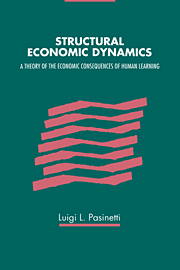Book contents
- Frontmatter
- Contents
- Preface
- Acknowledgements
- List of symbols
- I Economic theory and the neglect of structural change
- II A pure labour production economy
- III Proportional dynamics
- IV Structural dynamics
- V The evolving structure and level of prices
- VI Consumption, savings, rate of interest and inter-temporal distribution of income
- VII On the evolving structure of long-term development
- VIII From the ‘actual’ towards the ‘natural’ economic system – the rôle of institutions
- IX Boundedness of economic systems, and international economic relations
- References
- Index
IX - Boundedness of economic systems, and international economic relations
Published online by Cambridge University Press: 17 September 2009
- Frontmatter
- Contents
- Preface
- Acknowledgements
- List of symbols
- I Economic theory and the neglect of structural change
- II A pure labour production economy
- III Proportional dynamics
- IV Structural dynamics
- V The evolving structure and level of prices
- VI Consumption, savings, rate of interest and inter-temporal distribution of income
- VII On the evolving structure of long-term development
- VIII From the ‘actual’ towards the ‘natural’ economic system – the rôle of institutions
- IX Boundedness of economic systems, and international economic relations
- References
- Index
Summary
Multiplicity of economic systems
The analysis of the foregoing chapters refers to a single economic system. But we know that in reality there are many economic systems. Why?
Traditional economic theory has never given, and in fact is unable to give, an answer to this question. As traditionally considered, an economic system is, one might say, open-ended; it offers no reason why it should not be extended to the whole world.
Of course there may be many explanatory circumstances from outside economics. Historical, political, religious, cultural, ethnic factors weigh heavily on the formation of separate political entities, which then necessarily make up separate economic systems. But common sense warns us that it is not reasonable to think that economic factors should be completely extraneous.
The theoretical (production) scheme presented here contains an important explanation of why each economic system is necessarily bounded; and therefore, indirectly, of the fragmentation of the world into a multiplicity of economic systems.
Once again the source of the explanation is to be found in macro-economic condition (IV.10.5) – the ‘necessary’ condition for economically significant equilibrium solutions. As has been pointed out, this condition concerns and connects the entire economic system to which it refers. Hence it makes of it a unitary entity, and at the same time separates it from all other economic systems. In other words, macro-economic condition (IV.10.5) requires a delimitation of the economic system to which it refers; for two reasons, which correspond to its two (symmetric) aspects.
- Type
- Chapter
- Information
- Structural Economic Dynamics , pp. 148 - 176Publisher: Cambridge University PressPrint publication year: 1993



